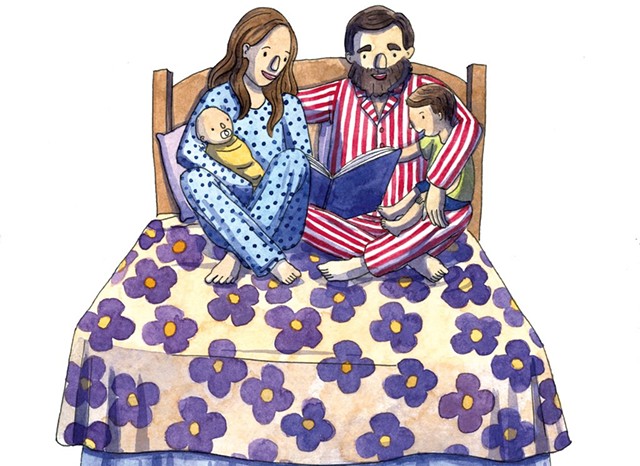
- molly walsh
I was putting a fresh diaper on 5-day-old George when I heard the front door bang open. "We're okay!" my husband, John, called from the living room. I scooped up the baby and ran to find John in the doorway cradling our 3-year-old, Levi. Both of them were covered in blood. A rag John held to Levi's forehead leaked red droplets onto our welcome mat.
Levi saw my shocked face and began to whimper.
"We're okay," John repeated, giving me a pull yourself together look. "Levi had a bit of a bike accident, and I'm taking him to the doctor." He grabbed his keys and the two of them were off. Shaking, I laid baby George in his bassinet, sat down and sobbed.
Nothing since George's birth in September had gone the way I'd hoped it would. I wondered, not for the first time, if having a second child had been a huge mistake.
George entered the world like his brother: painful labor and an unplanned C-section. But that's where the similarities ended. With Levi, John and I spent the first four days in the hospital together while the three of us learned how to be a family. We ordered huge plates of room service, took naps, and spent hours holding and gazing at our beautiful new son. Photos document us proudly buckling him into his car seat for the ride home, posing with favorite nurses and bouquets of flowers.
This time, John spent one night in the hospital after George's birth, then left to take care of Levi, who'd been juggled between family and friends in the two days since my labor had begun. Instead of feeling the fullness of our family expanding, I felt it fracturing, breaking; George and I were in the hospital, while John and Levi were at home.
These feelings are common, according to Carmen Maron Walker, a South Burlington psychotherapist specializing in prenatal and postnatal counseling and parenting support. While many parents expect to come home to some challenges after the birth of a second child, Walker said, the shift actually happens earlier — in the hospital, or even on the way there.
"It's the moment of departure from our family unit of three. If we're not expecting that, it can feel like a shock," she explained — for parents, and for the older child. "There's grief and loss involved."
The night John brought Levi to the hospital to meet George, I was unsure of what to expect. Levi appeared in the doorway, holding an enormous vase of flowers he'd picked from our yard. He gave me the long hug I'd been craving, then climbed up on a chair and giddily peered into the plastic crib and said hello to his little brother for the first time. Then he climbed back into my bed and ate my entire tortellini dinner while snuggled in my lap.
When it was time to leave, though, he fell to the floor in great, heaving sobs. I'd never spent more than one night away from my son. This would be night three. I assured Levi that I would be home soon, but what I couldn't tell him was that everything would be back to normal. Because, of course, it wouldn't.
Things Fall Apart
I knew that introducing a new baby wasn't going to be easy. I'd read all about the emotions an older sibling might experience.
"Intense feelings of fear, loss, betrayal, anger and resentment are to be expected for these older children, commonly expressed through limit-pushing behavior," explains parenting expert Janet Lansbury on her website janetlansbury.com. "None of this is easy or looks pretty — emotional pain is never pleasant to witness — but the discomfort eventually eases if we can consistently assure our kids they have our empathy, protection and love."
I was up for the challenge, and even welcomed it — in the abstract. I'd imagined Levi having brief tearful events followed by long heart-to-heart talks. I would let him know that all his emotions were natural and valid, and, because of my amazing parenting skills, he would quickly adapt and learn to embrace his younger brother.
This was delusional. First, Levi isn't a big talker. He's still developing his language skills and is an introvert to boot. This made it exceedingly difficult to have an honest conversation about his feelings. Second, I was too tired and taxed by the demands of a newborn to be the amazing parent I wanted to be. In fact, in the brief time I'd been parenting two children I felt completely inept, like I wasn't qualified for the job. Levi's accident and resulting stitches felt like a confirmation of my incompetence. This sense that I was failing, coupled with fatigue and hormones, had me in tears every few hours.
Walker explains these feelings well. "When we're sleep deprived, our bandwidth is a lot shorter. Our resilience is a lot shorter," she said. "And with the second, there's a lot being asked of us. It puts us in this unrealistic predicament where more is being asked of us than we can give. It's hard to be graceful through this transition."
In bed, the night of Levi's accident, it was John's turn to fall apart. If I felt guilty about it, John felt downright responsible. And the trip to urgent care had been traumatic. The attending physician wasn't used to children, and they'd resorted to holding Levi down on the table to stitch his wound, blood pooling in his eyes as he screamed, "Help me, Daddy!" I held John as he finally let go of the emotion that — for Levi's sake — he'd been keeping in all day.
Survival Mode
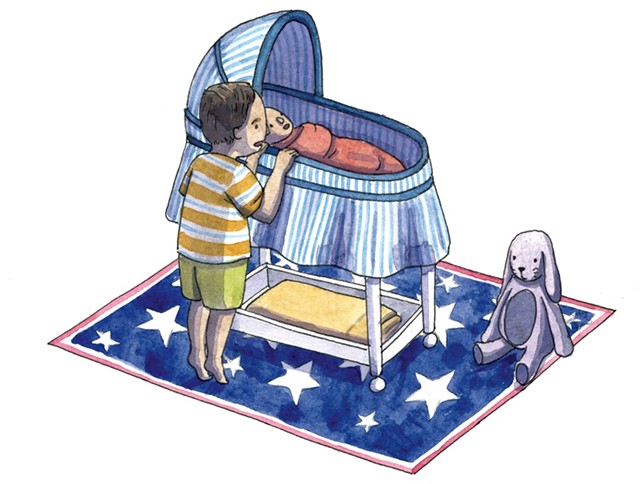
- molly walsh
George's first weeks at home were far more difficult than I'd imagined they would be. My recovery was slow and painful and, at a time when Levi needed me more than ever, I was often unavailable. I would try to put him to bed only to be interrupted by a crying, hungry baby. Levi wanted to be carried, but my C-section incision needed to heal.
And it didn't help that George wasn't much of a sleeper. John and I both were running on fumes, short on patience and perspective. Levi had started sucking his thumb again, and picked at the stitches on his head so that they refused to heal. No matter what was asked of him, he threw an all-out tantrum — on the floor screaming, sobbing, throwing toys, ripping up his favorite books, the works. He didn't want to go to school. He didn't want to come home. He didn't want to do anything but watch marathon sessions of "Little Einsteins," and we let him. Our better judgment was eclipsed by our mental and physical exhaustion.
I wasn't alone in my underestimation of how much work the second would be. In talking with Richmond father Steve O'Malley, he shared that "When we brought home our second, I naively assumed that the jump-in workload would be minimal. I knew what I was doing with the first, so it should be just a little more laundry, a little more food, et cetera. Right? Wrong."
What many optimistic parents forget is that doing things for two children often takes twice as long, and cuts deeply into parents' already limited time for sleep and self-care. "Small children try to kill you through sleep deprivation," O'Malley joked. "Having two at the same time, we were in a constant state of fatigue. We were operating in survival mode. Housework, maintenance, exercise and grooming habits all suffered."
Taking Control
When John returned to work three weeks after George was born, my sister, Abby, flew out to help. At that point I was well aware that I was not parenting Levi the way he needed me to, and Abby, a seasoned nanny turned family psychologist, didn't pretend otherwise. It was hard to have the big sister I admired so much see me at my worst.
Levi refused to take naps, though he needed them badly. I wasn't physically able to keep up with him and was allowing him to watch hours of TV every day. The schedules and boundaries that were so essential to Levi's well-being had fallen away, and he was obviously suffering.
My sister had ideas for managing Levi. She encouraged me to be firmer. To put my foot down and make him behave. I tried, but her ideas just didn't work, and each letdown felt like a personal failure. Finally, I realized that while my sister is an expert on kids in general, she wasn't the expert on my kid — I was. And so I stopped wallowing in what-ifs and got down to work, doing my best to get back to parenting the way Levi needed me to.
It wasn't perfect. Just a few weeks postpartum, it was still difficult to physically enforce rules, so I made fewer of them. Naptime became quiet time. Messes stayed messy. And though I still felt like I was failing a lot of the time, I pretended otherwise. I stuffed my negative feelings down and acted like his tantrums didn't scare me; like I knew what I was doing. And that everything was going to be okay.
I was basically trying to achieve what parenting instructor Lansbury calls "confident momentum." "It's a positive, sometimes heroic kind of energy, an I-can-do-this-thing attitude of helpfulness that stems from the understanding that it's perfectly normal for young children to stall, resist and test limits," she writes on her website. "Our momentum is even more important if we have personal physical issues or very strong children," Lansbury continues, which is often the case in the wake of a birth.
I found that faking this sense of confidence was exactly what Levi needed from me. He was able to relax a bit, more secure in my ability to care for him and my apparent belief that everything was going according to plan. I felt good about being able to provide that, even if it was a false front.
A week after my sister left, I was able to pump some milk and leave George for a few hours so I could take Levi to the library and a new gelato place. He ate his pink grapefruit scoop in silence as I tried to make conversation. It felt like an awkward first date. But then, in the car ride home, he opened up. "George is not my boy," he said. "He's not my best friend." I took a deep breath. "I know, honey. You don't have to like him. You don't have to like any of this."
When we got home, I held him for a long time before we went inside. His willingness to talk about his feelings was the glimmer of hope I'd been waiting for. I no longer had to pretend that we were going to get through this — I genuinely believed it.
On Heartbreak, and Rebuilding
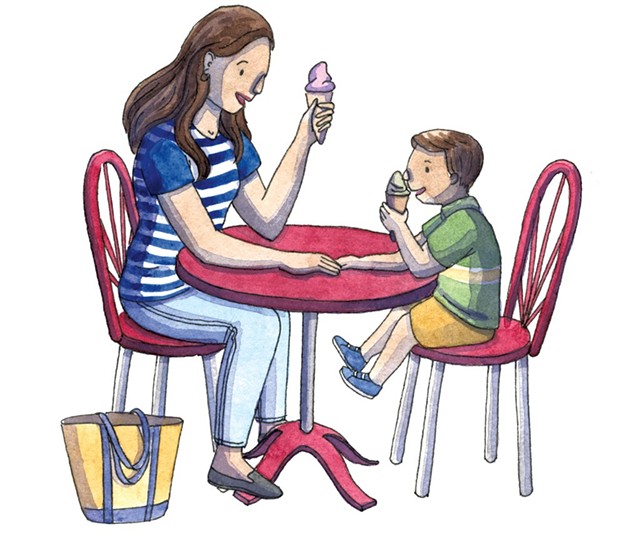
- molly walsh
I ran into my neighbor Alissa Monte recently, and confessed how terrible the first month had been. She nodded. They'd added a second child to their family about a year before and, though I'd never noticed them suffering, apparently they'd been through similar heartbreak with their oldest.
"You know that big emotional sobbing fest, that hormone flush, that comes after you have a child?" Monte told me. "Well, for me, after our son was born, it happened when I looked at my daughter. And I was like, Oh. What we had was gone. That sounds dramatic, I know."
It's not dramatic, though. And, as it turns out, it's really common. It's not often discussed publicly, but behind closed doors many parents speak about a rift that opens up between themselves and their firstborn at the birth of the second. It can be heartbreaking — for the older child, and for the parent as well.
Recognizing the pain caused by the birth of a new baby can feel strange, even wrong. After all, a baby is a blessing. You're not supposed to have negative feelings around your child's birth. But owning our feelings of loss is not a judgment on these babies, and it doesn't negate what they add to our lives. In fact, it's a necessary part of moving forward.
Says psychotherapist Walker: "What often happens when we experience change is we resist it — we don't want it — and that's where it can get really painful. If we can mark the change with some openness and flexibility, rather than resisting the change, it can be a lot easier."
"There's something about the heartbreak of getting a younger sibling," said Monte. "It's like it takes what was there and burns it away and it's raw. But what's left, what gets rebuilt, is beautiful."
She's right. Heartbreak can be a gift when it gives way to growth. And while it was excruciating to be the cause of Levi's pain, he was definitely growing. We all were.
The New Normal
When things felt fractured, I grieved, and then kept going. Life slowly got easier. My body was healing, and at six weeks postpartum I was able to pick up Levi and hold him again. Soon, I was able to sweep my tantruming toddler into my arms, hug him and assure him he would always be my baby. Our days became more structured, my confidence increased and his outbursts subsided. He's still 3, so it's not like they were going to go away altogether, but they have lessened in frequency and ferocity.
Our family is healing, too. Settling into the new normal is a work in progress. Six months in, things are better, though still not easy. We're starting to feel like more of a family unit, and our days have begun to find a rhythm. John walks Levi to preschool every day, I stay home with George, and weekends we spend together as a family. Some days it still feels like I'm surviving moment to moment, but I'm making peace with that.
While Levi is still skeptical of George at times, he's interested in him. In fact, he's become something of a George expert, and often offers me directions on how to handle his cries. Levi loves to give George toys and show him off to his friends at school, and he delights in the fact that he can make George laugh like nobody else.
We've established some new family traditions, including reading a book all together at bedtime, before I nurse George and put him to bed. And though we're not religious, we've started saying grace before each meal. The simple prayer from my childhood provides a moment of comfort and peace, and reminds us to be grateful for the bounty before us — even when that bounty looks an awful lot like chaos.
Resources
COMMUNITY: We are fortunate to have a network of loving friends. One of them set up a Mealtrain and, for several weeks after George was born, nutritious dinners were delivered to our house, along with love and support. Baskets of diapers and treats appeared on our porch. Neighbors and friends checked in often, offering a helping hand and emotional support.
SELF-CARE: For me, this means a good therapist, some alone time — including time to write — and nights out with friends every now and then. For others it might mean time to exercise, create art or practice their faith. Whatever form it takes, self-care is essential.
SIBLING PREP CLASSES: These workshops are a good place to make local connections with families going through similar transitions. Check out Beginnings or Birth Journeys for classes. Call your insurance company to see if they cover the cost.
BOOKS: For practical advice with a dose of humor and understanding, read Siblings Without Rivalry, by Adele Faber and Elaine Mazlish. No Bad Kids: Toddler Discipline Without Shame, by Janet Lansbury, is a guide to providing a stable framework for your older — or only — child.
Follow Kids VT contributor Grace Per Lee on Twitter at @graceperlee.


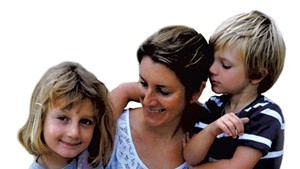






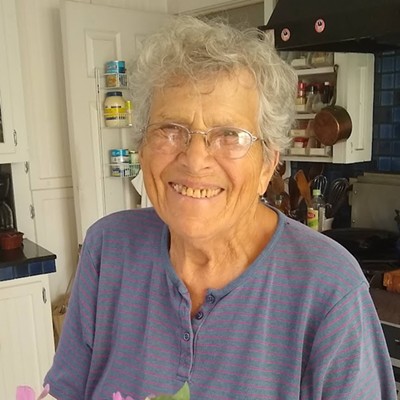

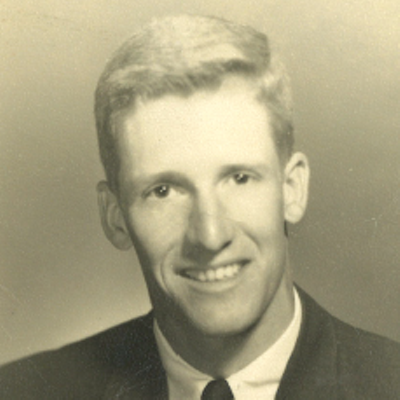
Comments (10)
Showing 1-10 of 10
Comments are closed.
From 2014-2020, Seven Days allowed readers to comment on all stories posted on our website. While we've appreciated the suggestions and insights, right now Seven Days is prioritizing our core mission — producing high-quality, responsible local journalism — over moderating online debates between readers.
To criticize, correct or praise our reporting, please send us a letter to the editor or send us a tip. We’ll check it out and report the results.
Online comments may return when we have better tech tools for managing them. Thanks for reading.